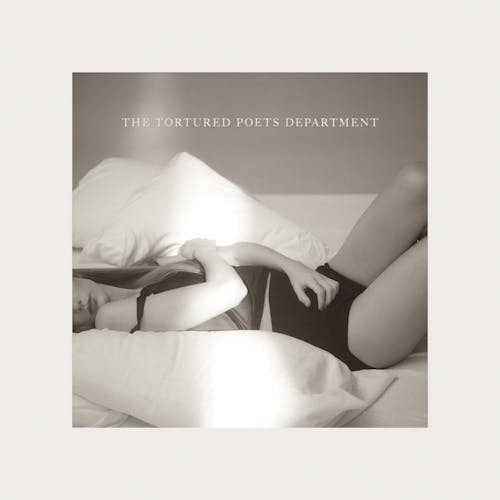Though it's no longer 'Stick Season,' this album's themes are always relevant

On Oct. 14, 2022, Noah Kahan released his third album, "Stick Season." At the time, I had never heard of Kahan’s name, never heard any of his songs or albums and only vaguely knew that "Stick Season" was a term used in Vermont.
A week later, though, I discovered the album thanks to a friend's suggestion and, of course, from TikTok. When listening to the album for the first time, I had low expectations. I'd never really been interested in folk music and was in the midst of binge-listening to "Dayglow."
Nevertheless, I clicked the Spotify link my friend sent me to Kahan’s latest album, listened to the album for the first time and was immediately captivated. I was certainly late to the Kahan train, but I am so thankful that I didn't miss it.
The 14-track, roughly 55-minute folk-rock album, detailing Kahan’s experience growing up in a small town in Vermont, might not seem like much to people living outside of the New England area. But the album builds a connection between the listener and Kahan as he expresses his struggle with mental health, loss, loneliness and his conflicting feelings toward the town he grew up in.
Shortly after listening to the album, I discovered that stick season is an unofficial season in Vermont that takes place between fall and winter, where all the leaves have fallen off the trees, but there's no snow on the ground, leaving a barren scenery.
Growing up in New Jersey, I haven't ever truly experienced a stick season, and yet when listening to the album, I couldn't help but feel as if I was experiencing my very own stick season for the first time. Kahan’s use of guitar mixed with his sorrowful vocals throughout the album transports you to a sort of campfire scene in the forest, an eerie comfort the listener can't resist.
Kahan’s true strength lies within his ability to convey raw emotions. Whether Kahan is discussing his feelings toward where he's from, his inability to move on with life, his struggles with substance abuse or mental health, every emotion feels like it's coming straight from his soul.
This authenticity is refreshing compared to many albums nowadays that feel overly produced and as if they are reaching for something they can't quite grasp. That's not to say every album needs to be deep or hard-hitting — I love Calvin Harris as much as the next person — but Kahan delivers a raw and refreshing performance that's hard to come by in the current music scene. Giving credence to this idea is the fact that he wrote the entire album from his childhood home.
What makes this album transcend past the minutia of New England is not only the subject matter but also the makeup of the songs themselves. Songs like "Northern Attitude," "Stick Season," "All My Love," "She Calls Me Back," "New Perspective," "Everywhere, Everything," "Orange Juice," "Homesick" and "The View Between Villages" may have slow verses in them at times, but all have crescendoing larger than life choruses.
These nine songs demonstrate great versatility, perfect for signing in the shower, therapeutically scream-singing into the void or having a karaoke session in the car with friends.
Tracks like "Northern Attitude" and "Homesick" are amongst Kahan’s catchiest on the album and deal with Kahan’s struggles with his childhood town.
In "Northern Attitude," Kahan blames his morose view of life on where he grew up or his "Northern Attitude," even asking for forgiveness for these views. The track is punctuated by a fantastic, sing-at-the-top-of-your-lungs chorus that can make you feel like a true New Englander for a split second.
"Homesick" is a song that took off on TikTok, where Kahan describes how he's actually "sick" of his hometown but can't seem to leave. "Homesick" has another stirring rock chorus where Kahan describes feeling stuck in the same place, a sentiment that is likely relatable to most listeners.
I would be remiss to not mention Kahan’s most popular track on the album and another song that blew up on TikTok, "Stick Season." The song itself, "Stick Season," currently has more than 124 million plays on Spotify and for good reason. It's an extremely catchy song about the heartbreak and loneliness that came when Kahan's former relationship ended amidst the pandemic.
Kahan is especially vulnerable in this song, which speaks to the aforementioned authenticity he displays as an artist. He sings at the end of the chorus, "And I'm split in half, but that'll have to do." Kahan doesn’t just stop at his heartbreak, though, touching on his mental health struggles and alcohol abuse in the song as well.
While not necessarily the most popular, tracks like "Orange Juice" and "The View Between Villages" display Kahan’s genius. "Orange Juice" showcases Kahan’s fantastic storytelling ability when he invites an unidentified person to come over to his house after a party, leading to a discussion about the person’s former drug abuse and their relationship with Kahan now.
A grand post-chorus punctuates a harrowing tale about addiction and the changes that come with sobriety. Underneath that is Kahan and the person trying to navigate a new relationship where the former can't seem to let go of the past while all the latter wants to do is let it go.
Kahan sings about his friend, "You said my heart has changed and my soul has changed," but when it comes to himself, Kahan sings, "Feels like I've been ready for you to come home / For so long / That I didn't think to ask you where you'd gone / So why'd you go?"
The contrast of lyrics paints a somber picture of a relationship that will likely not last long despite the people in it having compassion for one another. Kahan seems to realize this by the end of the song, asking, "Are we all just pullin' you down?"
"The View Between Villages" is the final track on the album and one of it's most heartfelt. The song details Kahan’s emotions as he's driving past or close to his hometown. The track starts slow but continues to pick up throughout as he gets nearer and nearer to his childhood town, and his anxiety grows.
Early in the song, Kahan sings joyfully, "Feel the rush of my blood / I'm 17 again / I am not scared of death / I've got dreams again." Driving by his childhood town gives him life, youth and good memories. But as the song continues, Kahan’s memories turn darker. "The death of my dog, the stretch of my skin / It's all washin' over me, I'm angry again."
He ends the track and the album by singing, "The cars in reverse, I'm grippin' the wheel / I'm back between villages and everything's still." Kahan chooses to back away from his hometown with a sense of finality that, while painfully nostalgic, also seems healing.
I haven't even mentioned some of my other favorite tracks, but that's, in part, what makes the album so special. Every song is unique, memorable and brings a varied outlook on Kahan’s life experiences. Being incredibly replayable, this project belongs to a very select group of albums with no skippable songs.
Kahan’s ability to evoke a collection of emotions, connect with any listener and tackle issues like mental health or addiction makes "Stick Season" an incredibly memorable album and a confirmed must-listen.



